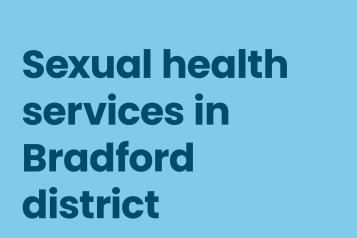Minority communities and young people in Bradford district help shape future sexual health services

Local 16-25-year-olds, LGBTQI+ and members of South Asian and African communities teamed up with Healthwatch Bradford and District, the health and care champion, to share their views and experiences and help ensure sexual health services meet the needs of everyone in Bradford district.
Bradford Council conducted a sexual health needs assessment and service review to understand what changes need to be made to the service model in preparation for re-procurement of sexual health services, focusing on the key challenges of reducing the negative impact of sexually transmitted infections and improving the positive impact of contraception on the health and wellbeing of Bradford’s population.
The council commissioned Healthwatch Bradford and District to provide additional targeted engagement from particular groups of interest and produce a report to inform the future commissioning of services.
As well as conducting a text chat-style survey for 16-25-year-olds – designed in tandem with local young people – Healthwatch took the opportunity to empower local groups and organisations to hold conversations with community members in ways that worked best for them, with the aim of using its platform as the local health and care champion to amplify those voices.
Feedback and suggestions
Focus groups were held by:
- Yorkshire MESMAC (LGBTQI+)
- Highfield Food Co-operative (South Asian men and African men)
- Highfield Food Co-operative (Young people)
- Bradford African Community (Black African men and women refugees)
The survey and focus group generated lots of valuable feedback and suggestions. A common theme was the need for services to be more tailored to the specific needs of our diverse communities – young people in particular wanted more weekend access and drop-in clinics, while the prospect of more remote appointments was raised in the focus groups.
The need for more training for those responsible for delivering services was raised repeatedly, with young people saying they sometimes felt uncomfortable in clinic settings. Services tailored to the specific needs of LGBT+ and particularly trans people were highlighted as a priority, along with more cultural awareness of ethnically diverse communities when supporting them with their sexual health.
A lack of awareness of both sexually transmitted diseases and exactly how and where to access support emerged across our survey and focus groups, along with a desire for more education and information about issues including consent, rape and abuse and tackling stigma around accessing services.
'Valuable insights'
Helen Rushworth, Lead Officer for Healthwatch Bradford and District, said: “We feel the project has been hugely positive, not just in the quality of information that has been produced but also in the new ways of working that have been established and the potential that exists for further future collaboration.
“We’re so grateful to everyone who took time to share such valuable insights through our survey and the focus groups.”
A spokesperson for the Public Health team at Bradford Council said: “The feedback provided by diverse members of our communities, through Healthwatch working with local groups and organisations, adds valuable new insights to our sexual health needs assessment and service review.
“These insights will help ensure that future sexual health services in Bradford district are designed and delivered to meet the needs of all who need to access them.
“We are grateful to the individuals, groups and organisations that played a part in ensuring these experiences and views were shared as part of this process.”

